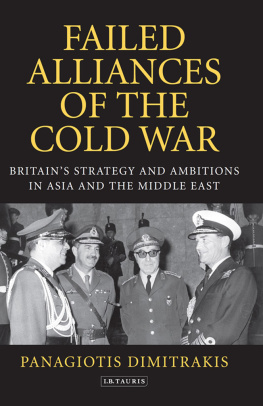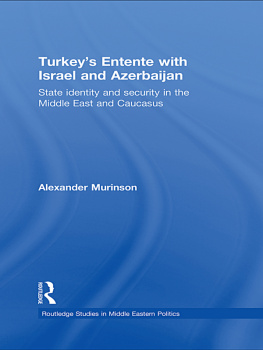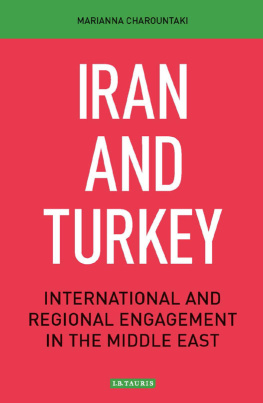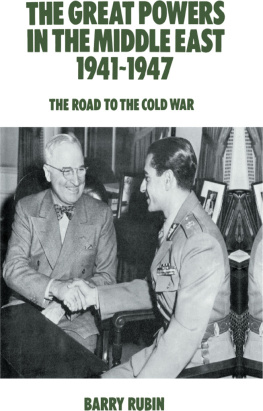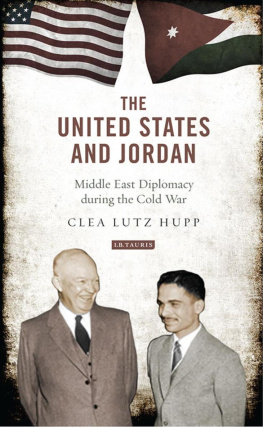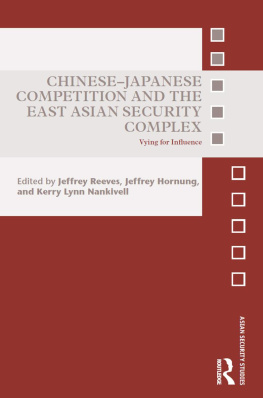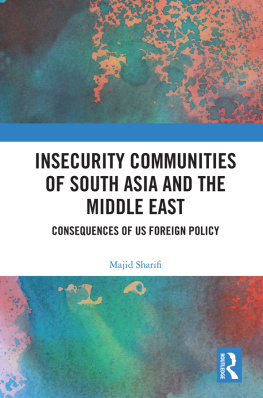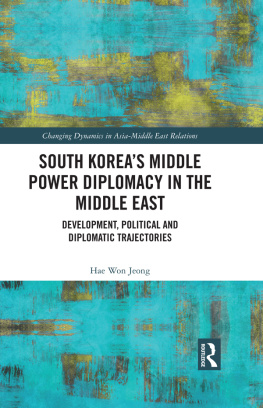Panagiotis Dimitrakis is an historian based in Athens. He has a PhD in War Studies from Kings College London, and is the author of Greece and the English: British Diplomacy and the Kings of Greece (2009); Military Intelligence in Cyprus: From the Great War to Middle East Crises (2010); Greek Military Intelligence and the Crescent: Estimating the Turkish Threat Crises, Leadership and Strategic Analyses, 19741996 (2010).

Published in 2012 by I.B.Tauris & Co Ltd
6 Salem Road, London W2 4BU
175 Fifth Avenue, New York NY 10010
www.ibtauris.com
Distributed in the United States and Canada
Exclusively by Palgrave Macmillan
175 Fifth Avenue, New York NY 10010
Copyright 2012 Panagiotis Dimitrakis
The right of Panagiotis Dimitrakis to be identified as the author of this work has been asserted by the author in accordance with the Copyright, Designs and Patent Act 1988.
All rights reserved. Except for brief quotations in a review, this book, or any part thereof, may not be reproduced, stored in or introduced into a retrieval system, or transmitted, in any form or by any means, electronic, mechanical, photocopying, recording or otherwise, without the prior written permission of the publisher.
International Library of Twentieth Century History 47
ISBN 978 1 84885 974 6
eISBN 978 0 85773 097 8
A full CIP record for this book is available from the British Library
A full CIP record for this book is available from the Library of Congress
Library of Congress catalog card: available
To Yiannis, Dimitra-Mimi and Timos
LIST OF ABBREVIATIONS
ANZUS | Australia New Zealand United States (defence agreement) |
BBC | British Broadcasting Corporation |
BRIAM | British Advisory Mission |
CENTO | Central Treaty Organisation |
CIA | Central Intelligence Agency (USA) |
CRO | Commonwealth Relations Office (UK) |
FCO | Foreign and Commonwealth Office (UK) |
GDP | Gross Domestic Product |
HMG | Her Majestys Government |
JCS | Joint Chiefs of Staff (US) |
JIC | Joint Intelligence Committee (UK) |
MACV | Military Assistance Command Vietnam (USA) |
MEC | Middle East Command |
MEDO | Middle East Defence Organisation |
MIDEASTFOR | Middle East Force (US) |
MoD | Ministry of Defence (UK) |
MPO | Military Planning Office |
NAM | Non-Alignment Movement |
NATO | North Atlantic Treaty Organisation |
SAS | Special Air Service (UK) |
SAM | Surface-to-Air Missile |
SEATO | South East Asia Treaty Organisation |
UAR | United Arab Republic |
UNFICYP | United Nations Force In Cyprus |
ACKNOWLEDGMENTS
Rosalie Spire provided excellent research assistance, and the staff at the National Archives, Kew, deserve a special mention for their advice and responsiveness. I also consulted the libraries of Kings College London, the London School of Economics (LSE), the Royal United Services Institute (RUSI) and the School of Oriental and Asian Studies (SOAS), all of whose staff were invariably polite, well-informed and helpful. Olympia Wood, John Wood and Peter Barnes offered their valued contributions to copy-editing, and would like to thank my editors Jenna Steventon and Tomasz Hoskins at I.B.Tauris for their meticulous work. Finally, owe a great debt to my family, Yiannis, Dimitra-Mimi and Timos, for their moral and material support, for the insightful foreign-policy and history-oriented conversations we have had, and for believing over all these years in my work.
INTRODUCTION
Alliances are as old as war; tribes, city-states, nation-states, sovereign states joined in treaties so as to defend their own territory, to help ensure their very survival in the face of an enemy. If their opponent was deemed too strong to be confronted without help, pride gave way to necessity, and short- or long-term alliances, usually dominated by the stronger party, came into being. From the Delos pact instituted by a prosperous Athens, primus inter pares in classical Greece, to NATOs war on terror today, states have understood the utility of cementing alliances finding ways to bring in other parties to back them in their own security policy. But what is the unique factor that every alliance needs for its existence?
To survive, an alliance needs a threat, an enemy; and it is on the fact of such a threat that the alliance depends. The threat of an invasion, for instance, raises fears about both the present and the immediate future, and this anxiety makes even hard-nosed nationalist leaders and generals think twice, and sign a pact to establish an alliance sharing military information, coordinating diplomatic initiatives, drafting war plans together, participating in joint exercises. No doubt common values and ideologies and shared interests, as well as balance-of-power considerations, contribute to joining forces, setting up economic-aid programmes and creating well-organised alliance structures such as permanent military committees. But the fear of an imminent or short-term threat (possibly in the form of a surprise attack by a seemingly powerful opponent) remains the vital ingredient that nurtures alliances.
In the twentieth century, the Axis, the Entente, the Allies, the Central Powers, the Warsaw Pact and later NATO all proved themselves successful alliances, though Axis and the Central Powers lost their wars and the Warsaw Pact was defeated in the Cold War. What signals success in the endurance of alliances? To win the war in the first place. But we may add a couple of other criteria. Success for an alliance means also staying together against all odds, maintaining the same (or roughly the same) perceptions of the threat, sharing a common security policy, enduring despair at the possibility of defeat, but fighting to the end and never abandoning your ally; it means planning together, sharing a command structure, technology and top-secret information (like the much valued and always top secret signals intelligence and decrypts). The success of an alliance can also be identified with honesty: true allies maintain goodwill, and do not attempt to extort excessive military and economic aid from each other; conferences between them should not resemble nineteenth-century Arab or Asian bazaars, where grotesque bargaining tactics are deemed acceptable behaviour. (Let us keep this in mind when we examine in the following chapters the positions CENTO and SEATO allies took during conferences.)
Does genuine fear of invasion and defeat bring honesty in dealings with allies? It is a daunting question, with debatable answers; in the case of Stalin who certainly lacked goodwill as an ally we may argue that only the fear of total catastrophe at the hands of Nazi Germany induced him to cooperate with Churchill and (later) Roosevelt. Indeed, Churchill reflecting on his troubles in dealing with Stalin remarked the only thing worse than allies is not having allies. Finally, a clause along the lines of NATOs Article 5 seems to be an absolutely necessary legal provision for establishing clear commitments and obligations, while demonstrating the alliances coherence to the rest of the world. However, such statements will serve little purpose in comparisons between the Entente, Axis and Anglo-American-Soviet summit consultations and agreements, because they were concluded in different geostrategic global environments (the 1900s, 1930s and 1940s respectively). All these assumptions do not offer a theory; they merely help in setting a general benchmark for assessing cooperation among states.

